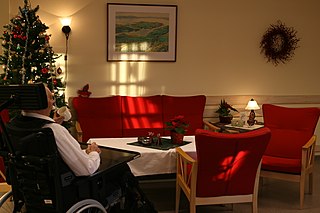Social work is an academic discipline and practice-based profession concerned with meeting the basic needs of individuals, families, groups, communities, and society as a whole to enhance their individual and collective well-being. Social work practice draws from areas such as psychology, sociology, health, political science, community development, law, and economics to engage with systems and policies, conduct assessments, develop interventions, and enhance social functioning and responsibility. The ultimate goals of social work include the improvement of people's lives, alleviation of biopsychosocial concerns, empowerment of individuals and communities, and the achievement of social justice.
Supportive housing is a combination of housing and services intended as a cost-effective way to help people live more stable, productive lives, and is an active "community services and funding" stream across the United States. It was developed by different professional academics and US governmental departments that supported housing. Supportive housing is widely believed to work well for those who face the most complex challenges—individuals and families confronted with homelessness and who also have very low incomes and/or serious, persistent issues that may include substance use disorders, mental health, HIV/AIDS, chronic illness, diverse disabilities or other serious challenges to stable housing.

The Rehabilitation Act of 1973 is a United States federal law, codified at 29 U.S.C. § 701 et seq. The principal sponsor of the bill was Rep. John Brademas (D-IN-3). The Rehabilitation Act of 1973 replaces preexisting laws to extend and revise the authorization of grants to States for vocational rehabilitation services, with special emphasis on services to those with the most severe disabilities, to expand special Federal responsibilities and research and training programs with respect to individuals with disabilities, to establish special responsibilities in the Secretary of Health, Education, and Welfare for coordination of all programs with respect to individuals with disabilities within the Department of Health, Education, and Welfare, and for other purposes. It created the Rehabilitation Services Administration.

Long-term care (LTC) is a variety of services which help meet both the medical and non-medical needs of people with a chronic illness or disability who cannot care for themselves for long periods. Long-term care is focused on individualized and coordinated services that promote independence, maximize patients' quality of life, and meet patients' needs over a period of time.
The Clubhouse model of psychosocial rehabilitation is a community mental health service model that helps people with a history of serious mental illness rejoin society and maintain their place in it; it builds on people's strengths and provides mutual support, along with professional staff support, for people to receive prevocational work training, educational opportunities, and social support. The model was created by Fountain House, one of the prime settings for what would, in the space of forty years, become the type specimen of the clubhouse model. Its validity is moderated and approved by Clubhouse International.
Peer support occurs when people provide knowledge, experience, emotional, social or practical help to each other. It commonly refers to an initiative consisting of trained supporters, and can take a number of forms such as peer mentoring, reflective listening, or counseling. Peer support is also used to refer to initiatives where colleagues, members of self-help organizations and others meet, in person or online, as equals to give each other connection and support on a reciprocal basis.
"The normalization principle means making available to all people with disabilities patterns of life and conditions of everyday living which are as close as possible to the regular circumstances and ways of life or society." Normalization is a rigorous theory of human services that can be applied to disability services. Normalization theory arose in the early 1970s, towards the end of the institutionalisation period in the US; it is one of the strongest and long lasting integration theories for people with severe disabilities.

Deinstitutionalisation is the process of replacing long-stay psychiatric hospitals with less isolated community mental health services for those diagnosed with a mental disorder or developmental disability. In the late 20th century, it led to the closure of many psychiatric hospitals, as patients were increasingly cared for at home, in halfway houses and clinics, in regular hospitals, or not at all.
Supported living or supportive living refers to a range of services and community living arrangements (CLAs) designed with individuals with disabilities and their families to support disabled citizens to attain or retain their independence or interdependence in their local communities. Supported living is recorded in the history of the NASDDDS, celebrating its 50th anniversary. Community Supported Living Arrangements (CSLA) was a landmark federal multi-state demonstration to illustrate the federal role in community living in the US. Supported living is considered a core service or program of community living programs funded through federal-state-local partnerships.
A mental health professional is a health care practitioner or social and human services provider who offers services for the purpose of improving an individual's mental health or to treat mental disorders. This broad category was developed as a name for community personnel who worked in the new community mental health agencies begun in the 1970s to assist individuals moving from state hospitals, to prevent admissions, and to provide support in homes, jobs, education, and community. These individuals were the forefront brigade to develop the community programs, which today may be referred to by names such as supported housing, psychiatric rehabilitation, supported or transitional employment, sheltered workshops, supported education, daily living skills, affirmative industries, dual diagnosis treatment, individual and family psychoeducation, adult day care, foster care, family services and mental health counseling.
Assertive community treatment (ACT) is an intensive and highly integrated approach for community mental health service delivery. ACT teams serve individuals who have been diagnosed with serious and persistent forms of mental illness, predominantly but not exclusively the schizophrenia spectrum disorders. ACT service recipients may also have diagnostic profiles that include features typically found in other DSM-5 categories. Many have histories of frequent psychiatric hospitalization, substance abuse, victimization and trauma, arrests and incarceration, homelessness, and additional significant challenges. The symptoms and complications of their mental illnesses have led to serious functioning difficulties in several areas of life, often including work, social relationships, residential independence, money management, and physical health and wellness. By the time they start receiving ACT services, they are likely to have experienced failure, discrimination, and stigmatization, and their hope for the future is likely to be quite low.
A group home, congregate living facility, care home, adult family home, etc., is a structured and supervised residence model that provides assisted living and medical care for those with complex health needs. Traditionally, the model has been used for children or young people who cannot live with their families or afford their own homes, people with chronic disabilities who may be adults or seniors, or people with dementia and related aged illnesses. Typically, there are no more than six residents, and there is at least one trained caregiver there 24 hours a day. In some early "model programs", a house manager, night manager, weekend activity coordinator, and four part-time skill teachers were reported. Originally, the term group home referred to homes of 8 to 16 individuals, which was a state-mandated size during deinstitutionalization. Residential nursing facilities, also included in this article, may be as large as 100 individuals in 2015, which is no longer the case in fields such as intellectual and developmental disabilities. Depending on the severity of the condition requiring one to need to live in a group home, some clients are able to attend day programs and most clients are able to live normal lifestyles.
The Fairweather Lodge Program is a psychosocial rehabilitation model in which residents live together and run or participate in a business that provides them with employment. As of 2006, there were over 90 Fairweather Lodges in 16 US states.
The psychiatric survivors movement is a diverse association of individuals who either currently access mental health services, or who have experienced interventions by psychiatry they consider unhelpful, harmful, abusive or illegal.
The recovery model, recovery approach or psychological recovery is an approach to mental disorder or substance dependence that emphasizes and supports a person's potential for recovery. Recovery is generally seen in this model as a personal journey rather than a set outcome, and one that may involve developing hope, a secure base and sense of self, supportive relationships, empowerment, social inclusion, coping skills, and meaning. Recovery sees symptoms as a continuum of the norm rather than an aberration and rejects sane-insane dichotomy.
Supported employment refers to service provisions wherein people with disabilities, including intellectual disabilities, mental health, and traumatic brain injury, among others, are assisted with obtaining and maintaining employment. Supported employment is considered to be one form of employment in which wages are expected, together with benefits from an employer in a competitive workplace, though some versions refer to disability agency paid employment. Companies such as Skilcraft in the United States are an example of "supported employment" which is defined in law for state and federal reimbursements.

Patricia E. Deegan is an American disability-rights advocate, psychologist and researcher. She has been described as a "national spokesperson for the mental health consumer/survivor movement in the United States." Deegan is known as an advocate of the mental health recovery movement and is an international speaker and trainer in the field of mental health.

Vocational rehabilitation, also abbreviated VR or voc rehab, is a process which enables persons with functional, psychological, developmental, cognitive, and emotional disabilities, impairments or health disabilities to overcome barriers to accessing, maintaining, or returning to employment or other useful occupations.
Community integration, while diversely defined, is a term encompassing the full participation of all people in community life. It has specifically referred to the integration of people with disabilities into US society from the local to the national level, and for decades was a defining agenda in countries such as Great Britain. Throughout recent decades, community integration programs have been increasingly effective in improving healthcare access for people with disabilities. They have been valued for providing a "voice for the voiceless"
Family support is the support of families with a member with a disability, which may include a child, an adult, or even the parent in the family. In the United States, family support includes "unpaid" or "informal" support by neighbors, families, and friends, "paid services" through specialist agencies providing an array of services termed "family support services", school or parent services for special needs such as respite care, specialized child care or peer companions, or cash subsidies, tax deductions or other financial subsidies. Family support has been extended to different population groups in the US and worldwide. Family support services are currently a "community services and funding" stream in New York and the US which has had variable "application" based on disability groups, administrating agencies, and even, regulatory and legislative intent.




